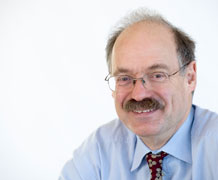
Sir Mark Walport, the Government's Chief Scientific Adviser, paid a visit to the University.
Government’s Chief Scientific Adviser visits University of Exeter
The UK’s Chief Scientist, Sir Mark Walport FRS, has made a special visit to the University of Exeter to meet with key representatives.
Sir Mark, who is the Government’s Chief Scientific Adviser and Head of the Government Office for Science, visited the University’s Streatham Campus on Tuesday, November 10th. He was accompanied on the visit by Gareth Davies, Director General for Knowledge and Innovation.
During the visit, Sir Mark took part in a major discussion with senior partners from the GW4 – a research alliance which brings together the combined strengths of the universities of Bath, Bristol, Cardiff and Exeter - on an emerging Research and Innovation strategy.
Speaking after the visit, Sir Mark said: “I was impressed to see how the GW4 are collaborating to make the most of their collective expertise, resources and research interests. I look forward to seeing how GW4 builds upon these strengths to create innovative and ground-breaking research.”
The GW4 event included academics from all four partner universities, as well as representatives from Local Enterprise Partnerships and the Welsh government. The meeting focussed on presentations and discussion of the five emerging research and innovation themes for GW4 - Data Analytics, Healthy Living, Cities, Sustainable Innovation and the Creative Economy.
Professor Nick Talbot FRS, Deputy Vice-Chancellor (Research and Impact) for the University of Exeter said: “We were delighted to be able to welcome Sir Mark Walport to the University of Exeter, and in particular to discuss the pivotal role the GW4 plays, both now and in the future, to the economic prosperity of not just the South West but the UK as a whole. The GW4 is a driving force behind so many crucial achievements in research and innovation, and this visit enabled us to present our vision for how to build on these in the coming years.”
Sir Mark was also given a tour of the University’s Living Systems Institute, a £52 million world-class, next generation collaborative research community currently under construction.
The Living Systems Institute, which opens in 2016, will develop a completely new approach to the analysis of Biological processes. It will take a holistic view of how cells, tissues and whole organisms operate and, importantly, what happens to them when they succumb to diseases.
A key approach of the Living Systems Institute will be the application of the techniques of mathematics, predictive modelling, control engineering and physics to understand, in detail, the operation and establishment of disease.
Professor Talbot added: “The LSI is a truly inter-disciplinary endeavour that will involve scientists across a host of disciplines who will pool their expertise to address the same critical research questions. The LSI will offer global leading researchers with world-class facilities, and we were proud to be able to show Sir Mark our vision behind this truly exciting venture at first-hand.
Date: 12 November 2015
